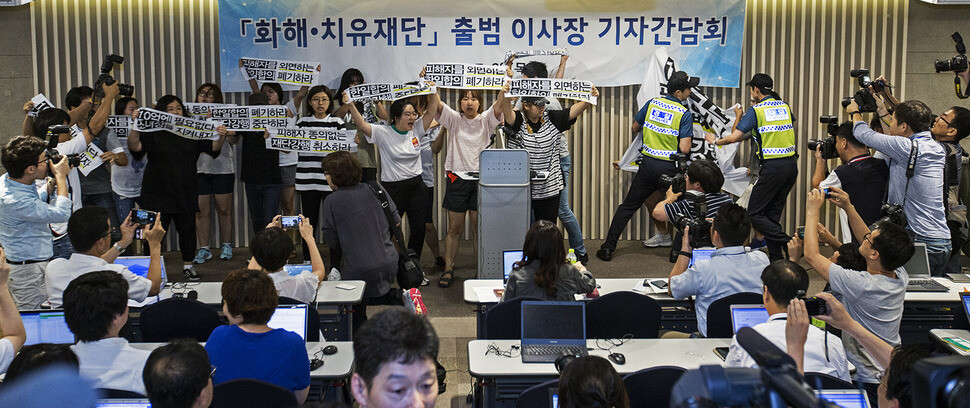hankyoreh
Links to other country sites 다른 나라 사이트 링크
Amid opposition, government to launch comfort women foundation

The Reconciliation and Healing Foundation is being launched on July 28 following an agreement between the South Korean and Japanese governments on Dec. 28 on the issue of the comfort women.
But with Seoul going ahead with the foundation’s establishment over the objections of some comfort women survivors themselves, the launch is expected to bring a major outcry.
“The Reconciliation and Healing Foundation will be holding its first board meeting and sign-hanging ceremony at 10 am on July 28,” a Ministry of Foreign Affairs official announced on July 27. The foundation’s secretariat will be occupying the Vabien Suites in Seoul’s Seodaemun district, with most of its preparatory committee members taking on board positions. Despite objections from numerous comfort women survivors, the South Korean government established an advisory committee in January and a preparatory committee for the launch on May 31, with Sungshin Women‘s University professor Kim Tae-hyun serving as chairperson.
Kyodo News reported on July 26 that the Japanese government appeared to be planning to make its lump-sum donation of one billion yen (US$9.5 million) to fund the foundation next month without making it contingent on the relocation of a statue honoring the comfort women that currently stands in front of the former Japanese embassy in Seoul.
“The agreement reached was for the South Korean government to establish the foundation to support the comfort women victims and for the Japanese government to make a lump-sum donation of funding,” explained South Korean Ministry of Foreign Affairs deputy spokesperson Seon Nam-guk in a July 26 briefing. “We expect the funding to be donated as pledged once the foundation has been launched.”
Kyodo News also reported that while Tokyo had originally indicated it would make the donation conditional on the statue’s relocation out of concerns about a public backlash, many in the government increasingly see a timely donation as necessary to boost South Korea-Japan ties following North Korea’s recent nuclear test and ballistic missile launches. This would mean that the Dec. 28 agreement and resulting foundation establishment bear some connection to the Korean Peninsula’s situation in the wake of the nuclear test and announced plans to deploy a Terminal High Altitude Area Defense (THAAD) missile defense system with US Forces Korea and attempts to build up a trilateral alliance with the US.
Meanwhile, the Korean Council for the Women Drafted for Military Sexual Slavery by Japan (Jeongdaehyeop), the Association to Support Japanese Military “Comfort Women” Survivors, and the National Peace Monument Alliance blasted the South Korean government‘s actions in a press conference on July 25.
“Since announcing a humiliating Dec. 28 agreement on the Japanese military comfort women issue that abandoned the victims’ demands and principles of human rights, the government has disregarded voices of opposition from the victims and citizens and going ahead with enforcement of the agreement, including the foundation’s establishment,” the groups said.
They went on to call for an “immediate nullifying of the South Korea-Japan agreement and halt to the foundation’s launch.”
“We urge the Japanese government to perform its legal responsibility so that justice is realized while even one victim remains alive,” they added.
By Kim Jin-cheol, staff reporter
Please direct questions or comments to [english@hani.co.kr]

Editorial・opinion
![[Editorial] Does Yoon think the Korean public is wrong? [Editorial] Does Yoon think the Korean public is wrong?](https://flexible.img.hani.co.kr/flexible/normal/500/300/imgdb/original/2024/0417/8517133419684774.jpg) [Editorial] Does Yoon think the Korean public is wrong?
[Editorial] Does Yoon think the Korean public is wrong?![[Editorial] As it bolsters its alliance with US, Japan must be accountable for past [Editorial] As it bolsters its alliance with US, Japan must be accountable for past](https://flexible.img.hani.co.kr/flexible/normal/500/300/imgdb/original/2024/0417/6817133413968321.jpg) [Editorial] As it bolsters its alliance with US, Japan must be accountable for past
[Editorial] As it bolsters its alliance with US, Japan must be accountable for past- [Guest essay] Amending the Constitution is Yoon’s key to leaving office in public’s good graces
- [Editorial] 10 years on, lessons of Sewol tragedy must never be forgotten
- [Column] A death blow to Korea’s prosecutor politics
- [Correspondent’s column] The US and the end of Japanese pacifism
- [Guest essay] How Korea turned its trainee doctors into monsters
- [Guest essay] As someone who helped forge Seoul-Moscow ties, their status today troubles me
- [Editorial] Koreans sent a loud and clear message to Yoon
- [Column] In Korea’s midterm elections, it’s time for accountability
Most viewed articles
- 1Samsung barricades office as unionized workers strike for better conditions
- 2[Column] The clock is ticking for Korea’s first lady
- 3[Editorial] When the choice is kids or career, Korea will never overcome birth rate woes
- 4Why Israel isn’t hitting Iran with immediate retaliation
- 5[News analysis] After elections, prosecutorial reform will likely make legislative agenda
- 6S. Korea, Japan reaffirm commitment to strengthening trilateral ties with US
- 7Japan officially says compensation of Korean forced laborers isn’t its responsibility
- 8[Editorial] As it bolsters its alliance with US, Japan must be accountable for past
- 9[Editorial] Does Yoon think the Korean public is wrong?
- 10[Guest essay] How Korea turned its trainee doctors into monsters